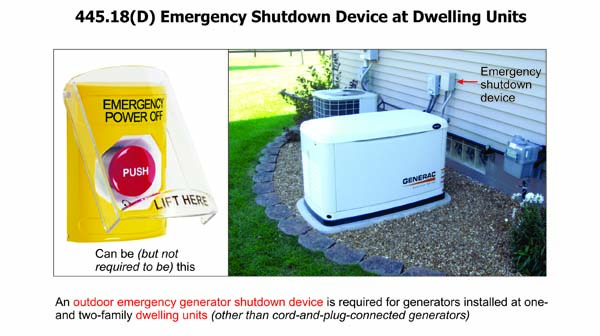445.18(D) Emergency Generator Shutdown in One- and Two-Family Dwelling Units
Change Summary
- An emergency shutdown device is now required to be located at a readily accessible outdoor location at dwelling units when an optional standby generator is installed. This requirement is not applicable for cord-and-plug-connected portable generators.
| NEC® Text |
|---|
|
445.18 Disconnecting Means and Emergency Shutdown of Prime Mover. Material taken from the National Electric Code® is reprinted with permission from NFPA 70®, 2020 edition. |
Expert Analysis
Is an emergency backup generator required to be installed at a dwelling unit? Of course, the answer to that question is NO. If an optional standby generator is installed at a dwelling unit (or most places), then NEC rules are mandatory for installation; in particular, rules in Article 445. New for the 2020 NEC, an emergency shutdown device is now required to be located “outside the dwelling unit” at a readily accessible location. This requirement is not applicable for cord-and-plugconnected portable generators. This requirement is also limited to one- and two-family dwelling as the title of 445.18(D) suggests.
This new requirement was primarily based upon providing first responders an accessible outdoor emergency shutdown device in an emergency situation such as a fire, gas leak, structural damage, or flooding.

This new requirement for an outdoor emergency generator shutdown device is a companion requirement for an emergency disconnecting means (which could include the service disconnecting means) for a one- or two-family dwelling be installed and located on the outside of the structure (see 230.85). This required outdoor emergency disconnect can consist of the service disconnect(s), a properly marked meter disconnect(s), or other listed disconnect switches or circuit breakers on the supply side of each service disconnect that are suitable for use as service equipment. All of these options must be properly marked to indicate that they are service disconnects, emergency disconnects, etc. with the marking in compliance with 110.21(B) as indicated at 230.85.
This same basic requirement for an emergency disconnect at a readily accessible outdoor location for dwelling units was implemented for other types of equipment: 480.7(A) (Storage Batteries), 694.22(C)(1) (Wind Electric Systems), and 706.15(A) (Energy Storage Systems).







